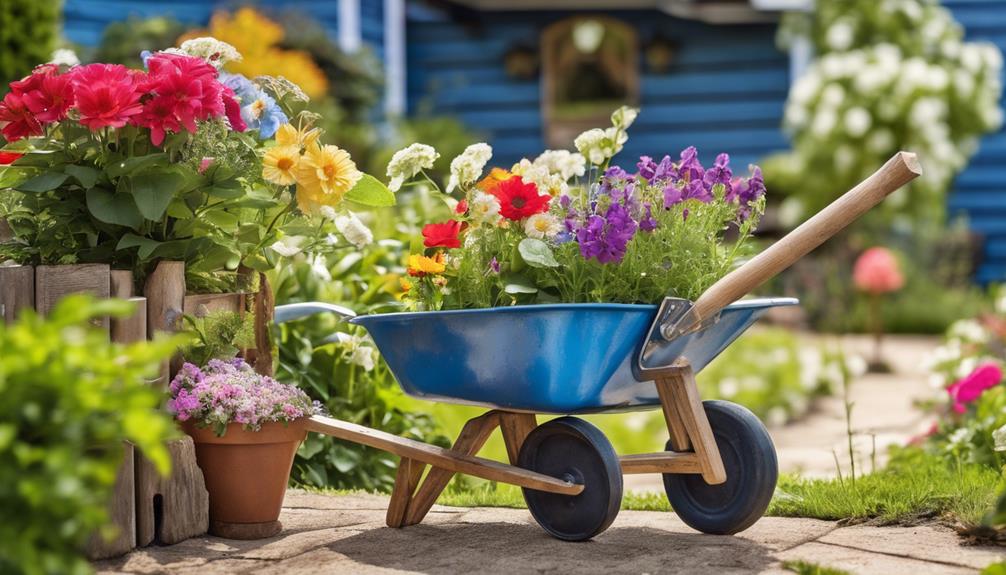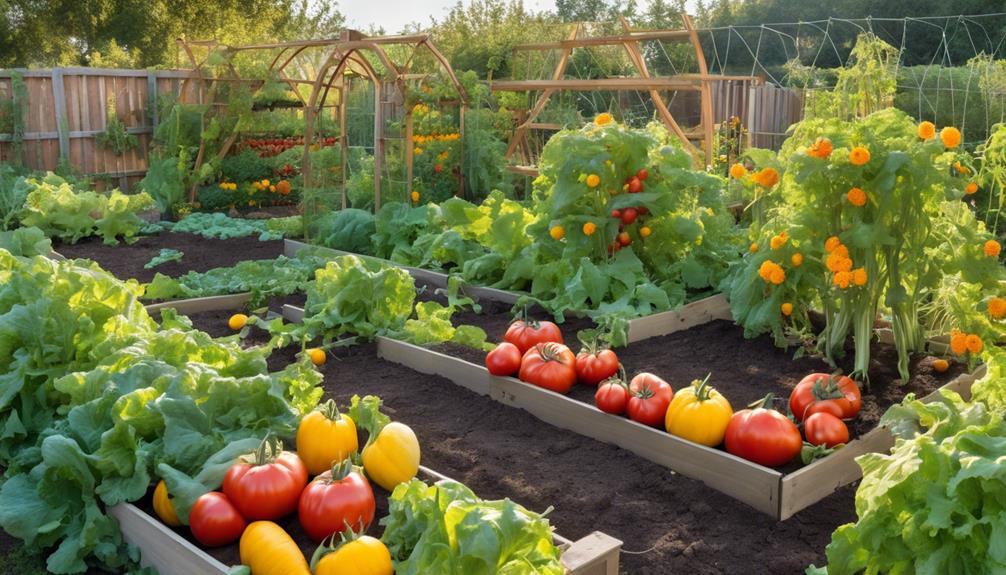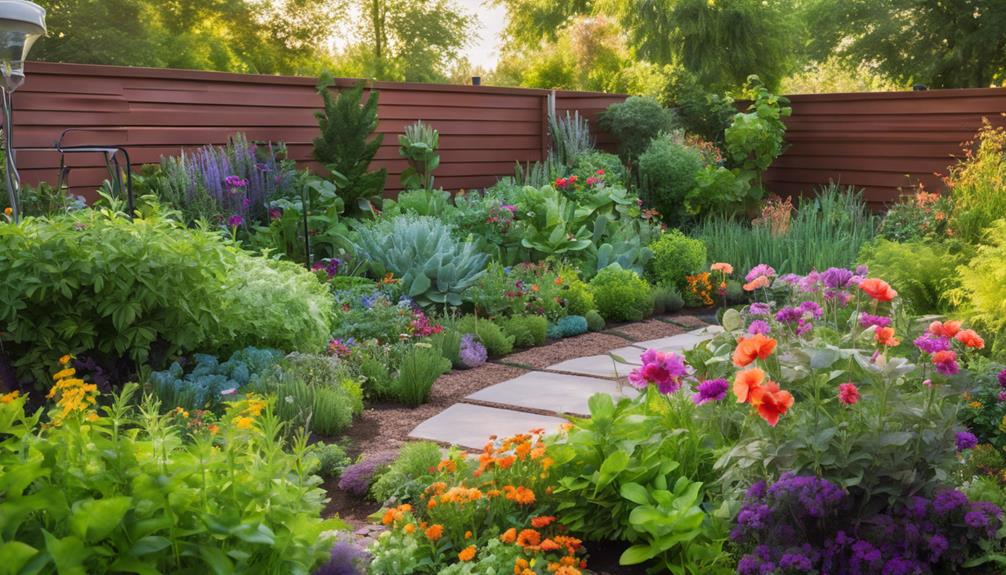
5 Inspiring Backyard Designs for Entertaining
17 March 2025
7 Tips for Installing Wooden Fences in Gardens
17 March 2025Successful garden care requires fundamental tools that promote plant health and soil quality. A high-quality spade is indispensable for digging, while a sturdy trowel ensures precise planting.
Secateurs provide clean cuts, fostering better growth, and hoes effectively manage weeds and aerate soil. Gloves protect hands from thorns, and soil testers help evaluate pH and nutrient levels for optimal plant vitality.
Implementing mulching materials retains moisture, while compost bins enrich soil. To guarantee robust plant development, proper watering systems are essential.
Exploring these tools further reveals effective methods to enhance your gardening efforts.
Garden Care Essentials Explained
Understanding the fundamental tools of gardening is vital for any successful gardening endeavour.
Equally significant is recognising the role of soil health in promoting robust plant growth.
Together, these elements form the foundation for effective garden care and sustainable practices.
Essential Gardening Tools
Equipping oneself with essential gardening tools is vital for cultivating a thriving garden. Key tools include a high-quality spade, which is indispensable for digging and turning soil, and a sturdy trowel for precise planting and weeding.
Secateurs are essential for maintaining plant health, allowing for clean cuts that promote growth. A hoe facilitates effective weed control and soil aeration, while a rake helps prepare garden beds and gather debris.
Furthermore, gloves protect hands from thorns and irritants, ensuring safety during labour. A watering can or hose with adjustable nozzles allows for efficient irrigation, catering to different plant needs.
Mastery of these tools not only improves productivity but also enhances the overall gardening experience, fostering a deeper connection with nature.
Soil Health Importance
Soil health is the cornerstone of a successful garden, influencing everything from plant growth to pest resistance. Healthy soil fosters a diverse ecosystem of microorganisms, which play a significant role in nutrient cycling and organic matter decomposition.
A balanced pH, adequate organic content, and proper drainage create an environment where plants can thrive. Additionally, well-structured soil improves water retention and prevents erosion, ensuring that plants receive consistent moisture.
Regular testing and amendment of soil can prevent deficiencies and toxicities, promoting optimal plant health. Incorporating practices such as crop rotation, cover cropping, and reduced tillage can also enhance soil vitality.
Ultimately, investing in soil health is an investment in the overall productivity and sustainability of your garden.
Soil Quality and Composition
Soil quality and composition are vital factors that influence plant health and growth.
Adjusting pH levels, balancing essential nutrients, and introducing beneficial microorganisms are key strategies to enhance soil properties.
Understanding these techniques will empower gardeners to create ideal conditions for their plants.
Ph Level Adjustment Techniques
Adjusting the pH level of garden soil is essential for optimising plant health and productivity, as the availability of nutrients is highly dependent on this critical factor.
Mastery of pH adjustment techniques enables gardeners to create an environment conducive to plant growth.
Consider the following methods for effective pH level adjustment:
- Lime Application: Incorporate agricultural lime to raise soil pH, enhancing calcium levels.
- Sulphur Supplement: Use elemental sulphur or aluminium sulphate to lower soil pH effectively.
- Organic Matter: Amend soil with compost to naturally stabilise pH levels.
- Wood Ash: Apply wood ash to increase alkalinity when required.
- pH Testing Kits: Regularly test soil pH to monitor and adjust as necessary.
Implementing these techniques will ensure a thriving garden ecosystem.
Nutrient Balance Strategies
Achieving a harmonious nutrient balance is crucial for maintaining ideal soil quality and composition, which directly influences plant health and growth.
To optimise nutrient availability, consider the following strategies:
- Soil Testing: Regularly analyse soil to determine nutrient levels and pH.
- Organic Amendments: Incorporate compost, manure, or green manures to improve nutrient content and soil structure.
- Crop Rotation: Rotate crops to prevent nutrient depletion and promote biodiversity.
- Cover Cropping: Utilise cover crops to enhance soil fertility and reduce erosion during off-seasons.
- Fertilisation Regimens: Apply balanced fertilisers based on soil test results to meet specific plant nutrient requirements.
Beneficial Microorganism Introduction
The introduction of beneficial microorganisms plays a vital role in enhancing soil quality and composition, markedly impacting plant health and growth.
These microorganisms, including bacteria, fungi, and protozoa, foster a thriving ecosystem that supports nutrient availability and soil structure.
Key benefits of introducing beneficial microorganisms include:
- Nutrient Cycling: Facilitating the breakdown of organic matter and releasing crucial nutrients.
- Disease Suppression: Outcompeting harmful pathogens, thereby protecting plant roots.
- Soil Structure Improvement: Enhancing aggregation, which improves aeration and water retention.
- Plant Growth Promotion: Enhancing root development and nutrient uptake through symbiotic relationships.
- Carbon Sequestration: Contributing to carbon storage, consequently improving soil sustainability.
Incorporating these microorganisms is a strategic approach for gardeners aiming for optimal soil health.
Soil Testing Procedures
Understanding soil testing procedures is crucial for optimising garden health and productivity.
By evaluating soil quality before planting, gardeners can make informed decisions regarding mulching for moisture retention and implementing effective organic pest control methods.
This foundational step guarantees that plants receive the necessary nutrients and environmental conditions for robust growth.
Test Your Soil First
Before embarking on any gardening project, a crucial step is to test your soil to determine its nutrient content and pH level.
Soil testing provides essential insights that can guide your gardening practices, ensuring optimal plant growth and health.
To effectively test your soil, consider the following procedures:
- Collect samples: Gather soil from various locations in your garden.
- Choose a testing method: Use a DIY kit or send samples to a laboratory for professional analysis.
- Analyse results: Review nutrient levels, pH, and organic matter content.
- Adjust soil composition: Amend your soil based on test findings to enhance fertility.
- Re-test periodically: Regular testing helps track changes and maintain soil health.
Mulching for Moisture Retention
After evaluating your soil's nutrient content and pH levels, the next important step in enhancing your garden's health is implementing effective mulching techniques.
Mulching not only conserves moisture but also suppresses weeds and improves soil quality over time. To optimise the benefits of mulching for moisture retention, consider the following strategies:
- Choose organic materials: Opt for wood chips, straw, or grass clippings to enrich the soil as they decompose.
- Apply a thick layer: Aim for 5-10 centimetres of mulch to effectively reduce evaporation.
- Keep mulch away from plant stems: Prevent rot by leaving space around the base of plants.
- Replenish regularly: Add new mulch as it breaks down to maintain moisture levels.
- Monitor soil moisture: Check regularly to confirm your plants receive adequate hydration.
Organic Pest Control Methods
Implementing organic pest control methods is essential for maintaining a healthy garden ecosystem while minimising chemical use.
These practices not only protect the environment but also encourage beneficial organisms. To effectively manage pests through organic methods, consider the following strategies:
- Neem Oil: A natural pesticide that disrupts the life cycle of pests.
- Beneficial Insects: Introduce ladybirds and lacewings to predate harmful insects.
- Companion Planting: Use plants that deter pests naturally, such as marigolds with vegetables.
- Diatomaceous Earth: A non-toxic powder that desiccates soft-bodied insects upon contact.
- Homemade Sprays: Utilise garlic or pepper-based concoctions to repel pests.
Enhanced Plant Growth Potential
Regularly utilising the appropriate garden care tools can significantly enhance the growth potential of plants. Essential tools not only facilitate efficient maintenance but also optimise environmental conditions conducive to plant health. For instance, precise watering systems ensure consistent moisture levels, while soil aerators improve nutrient absorption.
| Tool | Benefit |
|---|---|
| Soil Tester | Evaluates pH and nutrient levels |
| Pruning Shears | Encourages healthy growth |
| Mulching Materials | Retains moisture, suppresses weeds |
| Compost Bins | Provides nutrient-rich soil |
Employing these tools strategically can lead to robust plant development, ultimately enhancing the overall aesthetic and productivity of your garden. Mastery in tool usage empowers gardeners to create thriving ecosystems.
Garden Design Implementation Techniques
Effective garden design implementation techniques are crucial for optimising plant health and productivity.
Key strategies include companion planting to enhance growth and resilience, precise timing for fertiliser application, and a well-structured watering schedule.
Companion Planting Strategies
A thoughtful approach to companion planting can significantly enhance the productivity and health of a garden.
By understanding the relationships between different plant species, gardeners can create ecosystems that improve growth, deter pests, and optimise space.
Here are key strategies to consider:
- Nitrogen Fixation: Plant legumes alongside nitrogen-hungry crops such as sweetcorn.
- Pest Deterrence: Use marigolds to repel aphids and nematodes from susceptible plants.
- Pollinator Attraction: Incorporate flowering herbs to attract beneficial pollinators.
- Complementary Growth: Pair plants like tomatoes and basil to enhance flavour and growth.
- Space Optimisation: Utilise taller plants to provide shade for shade-loving varieties.
Implementing these strategies can lead to a more resilient and thriving garden ecosystem.
Fertilizer Application Timing
Timing the application of fertiliser is crucial for maximising plant health and ensuring ideal growth throughout the gardening season.
Understanding the best moments for fertiliser application allows gardeners to improve nutrient uptake and minimise waste. Here are key considerations for effective timing:
- Soil Testing: Analyse soil nutrient levels to tailor fertiliser application.
- Plant Growth Stages: Fertilise during critical growth phases, such as early spring for vegetables.
- Weather Conditions: Avoid application during extreme temperatures or drought.
- Crop Rotation: Adjust fertiliser timing based on previous crop nutrient demands.
- Scheduled Follow-ups: Implement a follow-up schedule for supplementary applications, especially for heavy feeders.
Watering Schedule Optimization
Maximising the watering schedule is vital for maintaining healthy gardens and ensuring efficient water use. A well-structured watering regimen not only conserves resources but also improves plant resilience.
To achieve ideal results, consider the following techniques:
- Assess Soil Moisture: Regularly check moisture levels to avoid over or under-watering.
- Time of Day: Water early in the morning or late in the afternoon to minimise evaporation.
- Plant Needs: Tailor watering frequency based on the specific requirements of different plants.
- Weather Monitoring: Adjust schedules according to rainfall and temperature fluctuations.
- Irrigation Systems: Utilise drip irrigation or soaker hoses to deliver water directly to the root zone.
Pest Management Strategies
Effective pest management is essential for maintaining a healthy garden ecosystem.
Strategies such as introducing natural predators, employing integrated pest management techniques, and selecting pest-resistant plant varieties can significantly reduce pest populations while minimising chemical interventions.
Natural Predator Introduction
Natural predator introduction serves as a crucial strategy in pest management, harnessing the natural balance of ecosystems to control harmful insect populations.
By integrating beneficial insects, gardeners can effectively reduce reliance on chemical pesticides while fostering a healthier garden environment.
Key considerations for successful natural predator introduction include:
- Selection of Appropriate Predators: Identify predators that specifically target the pests present in your garden.
- Timing of Release: Introduce predators when pest populations are at their peak for maximum impact.
- Habitat Improvement: Create a hospitable environment by planting diverse flora that supports both predators and prey.
- Monitoring and Maintenance: Regularly assess predator effectiveness and adjust strategies as necessary.
- Minimising Disruption: Avoid practices that may harm beneficial insects, such as broad-spectrum insecticides.
Implementing these strategies can yield sustainable pest control solutions.
Integrated Pest Management Techniques
Integrated Pest Management (IPM) techniques bring together a variety of strategies to combat pest issues in a holistic manner.
By integrating ecological principles with practical applications, IPM promotes sustainable gardening practices that minimise harm to beneficial organisms and the environment.
Key components of effective IPM include:
- Monitoring and identification of pests to understand their life cycles and behaviours.
- Cultural practices that improve plant health and resilience, reducing pest susceptibility.
- Biological controls utilising natural predators and parasites to manage pest populations.
- Mechanical and physical controls such as barriers and traps to prevent pest access.
- Chemical treatments as a last resort, employing targeted and eco-friendly options when necessary.
Implementing these strategies fosters a balanced ecosystem while ensuring effective pest management.
Pest-Resistant Plant Varieties
A growing number of gardeners are turning to pest-resistant plant varieties as a proactive strategy in pest management.
These cultivars are bred to withstand specific pests and diseases, thereby reducing the need for chemical interventions.
Selecting the right pest-resistant plants not only improves garden resilience but also promotes biodiversity and ecosystem health.
Here are key benefits of incorporating these varieties:
- Reduced Chemical Use: Minimise reliance on pesticides.
- Improved Plant Health: Increased vigour and growth potential.
- Biodiversity Promotion: Supports beneficial insects and wildlife.
- Cost-Effectiveness: Lowers long-term gardening expenses.
- Sustainability: Contributes to environmentally friendly gardening practices.
Why Choose TKL Birmingham Gardener
Choosing TKL Birmingham Gardener means opting for a service that prioritises excellence and expertise in garden care.
Our team comprises seasoned horticulturists who possess in-depth knowledge of local flora and soil conditions, ensuring tailored solutions for your unique gardening needs. We utilise state-of-the-art tools and sustainable practices, fostering an environment of healthy growth and vibrant landscapes.
Moreover, our commitment to ongoing education keeps us at the forefront of industry innovations, allowing us to implement the latest techniques and strategies effectively.
By choosing TKL Birmingham Gardener, you are assured meticulous attention to detail, creating a flourishing garden that reflects your vision.
Trust in our expertise to transform your outdoor space into a sanctuary of beauty and tranquillity.
Common Gardening Questions Answered
Many gardeners, whether novices or seasoned enthusiasts, often find themselves confronted with a variety of questions regarding best practices and effective techniques.
One common inquiry involves soil health; maintaining ideal pH and nutrient levels is essential for plant vitality.
Furthermore, gardeners frequently ask about pest management, emphasising the importance of integrated pest management (IPM) strategies that minimise chemical use while effectively controlling infestations.
Another prevalent question pertains to irrigation methods; understanding the balance between deep watering and avoiding over-saturation can improve root development.
Lastly, many seek guidance on seasonal planting schedules to guarantee peak growth and productivity.
Final Thoughts on Gardening
As gardeners reflect on their experiences and the knowledge they have gained, it becomes evident that cultivating a garden is as much about personal growth as it is about nurturing plants.
Mastery in gardening requires a commitment to ongoing learning and adaptation. To enhance your gardening experience, consider the following principles:
- Embrace experimentation with different plant varieties.
- Prioritise soil health to ensure optimal growth.
- Practise sustainable gardening methods to protect the environment.
- Build a community with fellow gardeners for shared insights.
- Document your gardening journey to track progress and challenges.




